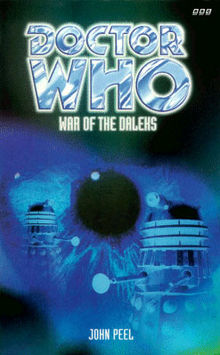The highlight of the novel is how Peel uses the Daleks to full effect: they have a formed caste system that makes an extreme sense and recontextualizes the grey Daleks of the classic series the easiest to defeat adding a level of tension to the novel. Daleks don’t just shout exterminate without actually doing anything in this novel, killing characters on sight. The plot concerning the Quetzal and the Thals are also highlights of the novel. Peel does an excellent job in touching on the idea of the Thals wishing to enhance themselves to be more like the Daleks in a bid to ending the fighting against the Daleks. Peel makes them have become a desperate race, sick of the war and plague the Daleks have caused throughout the cosmos. It’s an excellent plotline which creates an engaging moral dilemma for the first half of the novel. Sadly it gets wrapped up around the halfway point. This novel overall is structured quite like a television serial, in four parts with three chapters per part. The simple answer for why Peel did this is that he was adapting a script originally meant for television, with a few alterations to expand the scope and scale of the conflict. The second half of the novel shifts into what feels like a completely different story, one which I would call “The Trial of the Daleks”. It’s a plot like all the post “Genesis of the Daleks” stories bar “Remembrance of the Daleks” that gets overshadowed by the inclusion of the Daleks’ creator Davros. Davros is put on trial, unbeknownst to him, as defendant of the Dalek race which for some reason has decided that if found guilty they should undergo self-destruction. Some of the logic used by the Daleks and explanations given for the trial does not make sense, but that does not matter.
Yet, outside of these instances, there is quite a bit of War of the Daleks that just doesn’t work. First, the characterization of the Doctor and Sam Jones falls incredibly flat outside of the first chapter. The first chapter has the Doctor tearing apart portions of the TARDIS for repairs and in this scene we really get the sense on the aloofness and romantic nature of this incarnation of the Doctor, which disappears once they arrive on the Quetzal. They both revert into generic Doctor and companion characterizations, which is a massive step down from the portrayal in the previous novel. Peel attempts to give Sam a blasé attitude towards the Daleks, and pulls the joke that they don’t actually look threatening, but this really doesn’t work well because outside of this joke there isn’t any character to Sam. She also sees the destruction the Daleks cause firsthand and honestly she almost seems cocky when facing them. In the second half of the novel she also has absolutely nothing to do, with the Doctor taking center stage for the remainder of the book. Which doesn’t work because even when taking center stage, the Doctor doesn’t do much. There really isn’t any satisfactory resolution to this novel as the Daleks just sort of blow each other up really quickly. The final nail in the coffin for this novel so to speak is the retcon: the idea goes that in “Remembrance of the Daleks” the Daleks saw that the Doctor would use the Hand of Omega to blow up Skaro so they replaced it with a similar planet, Antalin, which in turn changes at least some of the motivation of every classic Doctor Who Dalek story. Now it’s nice to get an explanation for why Skaro exists, but the retcon is just too confusing and the plot almost stops for twenty pages or so to stop it. The opinions on this novel are incredibly conflicting, some of it’s great, some isn’t. 5/10.

No comments:
Post a Comment